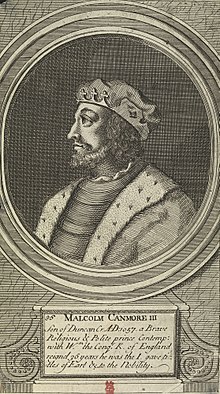Máel Coluim III of Scotland
| Malcolm III | |
|---|---|

Fanciful engraving of Malcolm c. 1725
|
|
| King of Alba (Scots) | |
| Reign | 1058–1093 |
| Coronation | 25 April 1058?, Scone, Perth and Kinross |
| Predecessor | Lulach |
| Successor | Donald III |
| Born | c. 26 March 1031 Scotland |
| Died |
13 November 1093 Alnwick, Northumberland, England |
| Burial | Tynemouth Castle and Priory, then in Dunfermline Abbey |
| Spouse |
Ingibiorg Finnsdottir St. Margaret of Scotland |
| Issue |
Duncan II, King of Scots Edward, Prince of Scotland Edmund Ethelred Edgar, King of Scots Alexander I, King of Scots David I, King of Scots Matilda, Queen of England Mary, Countess of Boulogne |
| House | Dunkeld |
| Father | Duncan I, King of Scots |
| Mother | Suthen |
Malcolm III (Gaelic: Máel Coluim; c. 26 March 1031 – 13 November 1093) was King of Scots from 1058 to 1093. He was later nicknamed "Canmore" ("ceann mòr", Gaelic for "Great Chief": "ceann" denotes "leader", "head" (of state) and "mòr" denotes "pre-eminent", "great", and "big"). Malcolm's long reign of 35 years preceded the beginning of the Scoto-Norman age.
Malcolm's kingdom did not extend over the full territory of modern Scotland: the north and west of Scotland remained under Scandinavian, Norse-Gael, and Gaelic rule, and the territories under the rule of the Kings of Scots did not extend much beyond the limits established by Malcolm II until the 12th century. Malcolm III fought a series of wars against the Kingdom of England, which may have had as its objective the conquest of the English earldom of Northumbria. These wars did not result in any significant advances southward. Malcolm's primary achievement was to continue a lineage that ruled Scotland for many years, although his role as founder of a dynasty has more to do with the propaganda of his youngest son David I and his descendants than with history.
Malcolm's second wife, St. Margaret of Scotland, is Scotland's only royal saint. Malcolm himself had no reputation for piety; with the notable exception of Dunfermline Abbey in Fife he is not definitely associated with major religious establishments or ecclesiastical reforms.
Malcolm's father Duncan I became king in late 1034, on the death of Malcolm II, Duncan's maternal grandfather and Malcolm's great-grandfather. According to John of Fordun, whose account is the original source of part at least of William Shakespeare's Macbeth, Malcolm's mother was a niece of Siward, Earl of Northumbria, but an earlier king-list gives her the Gaelic name Suthen. Other sources claim that either a daughter or niece would have been too young to fit the timeline, thus the likely relative would have been Siward's own sister Sybil, which may have translated into Gaelic as Suthen.
...
Wikipedia
